Tokenization in Dubai: Opening Real Estate to Everyone
Real estate tokenization in Dubai allows investors to legally buy fractional property shares through secure, regulated blockchain platforms.
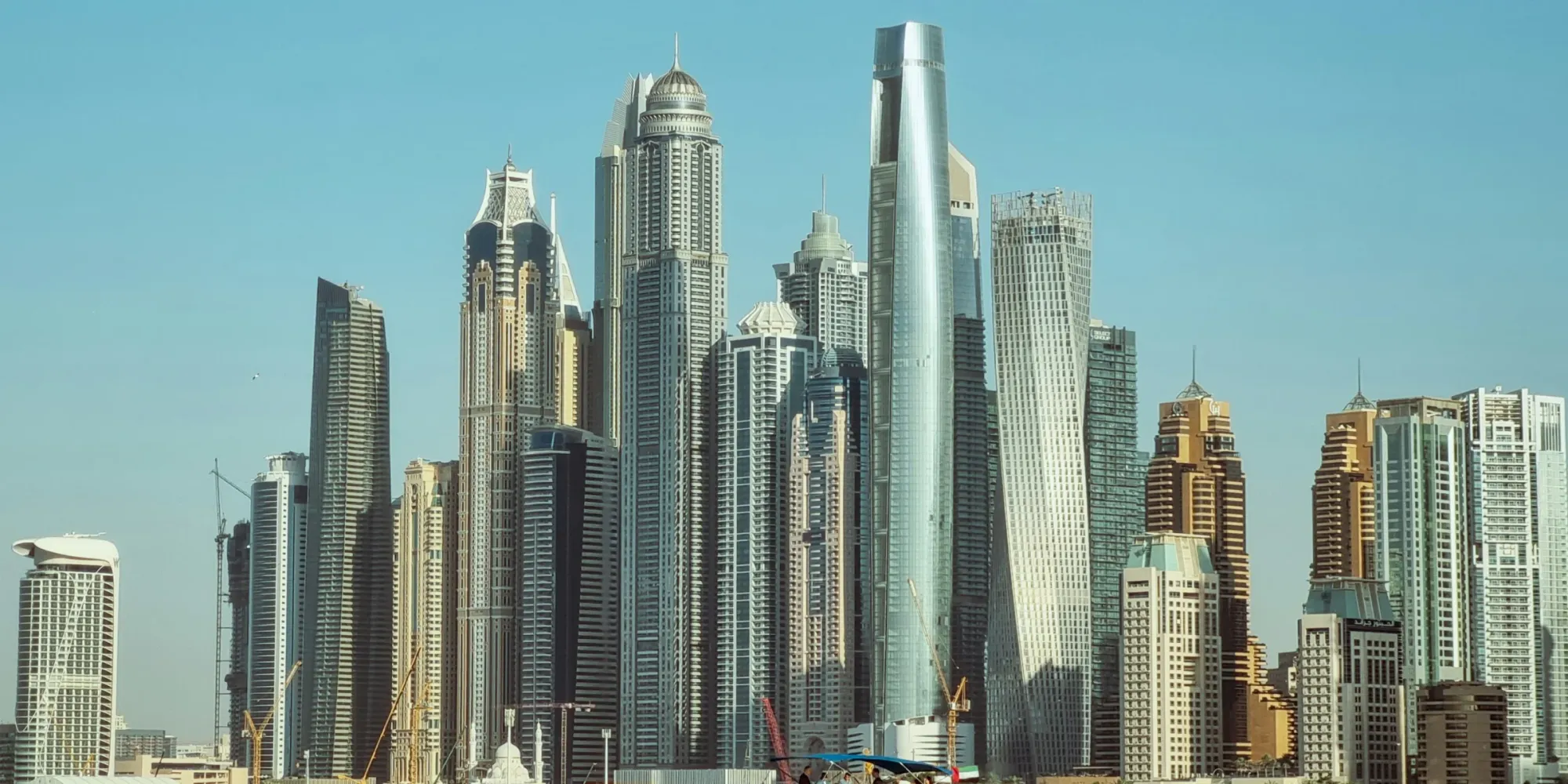
Imagine owning a slice of a Dubai skyscraper without needing millions. In Dubai, this idea is becoming reality. The city is using blockchain technology to let people buy fractional shares of property – a process known as real estate tokenization. Put simply, tokenization turns a building into many small digital tokens so that investors can purchase a tiny piece, much like buying a stock. This concept isn’t science fiction or a distant plan; it’s happening now in Dubai’s property market and is fully backed by local laws. The result is a more accessible, transparent way to invest in real estate, and Dubai has positioned itself at the forefront of this innovation.
We already discussed the tokenisation of real estate in Dubai in our previous article, but a lot has changed since then, so it's time to update the article!
What Is Real Estate Tokenization?
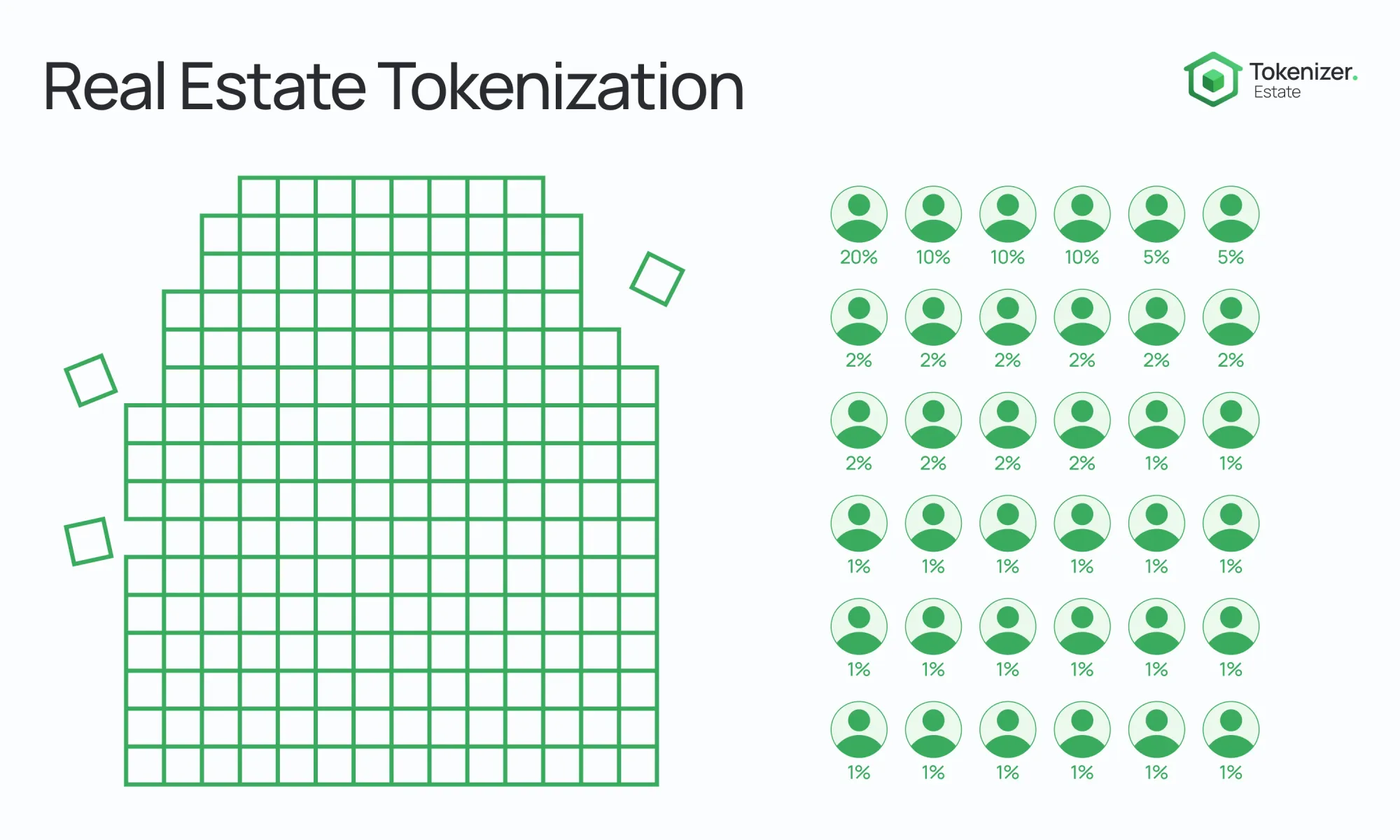
Real estate tokenization means breaking a property into digital shares that are recorded on a blockchain. Each token represents a fraction of the property’s ownership. For example, instead of one person owning 100% of an apartment, 100 people could each own 1% via tokens on a secure digital ledger. These tokens carry real value: they are backed by legal documents and title to the property, or the right to the income generated by that property.
Fractional ownership isn’t entirely new – people have long co-owned properties through funds or crowdfunding. But tokenization takes it further. Now, multiple investors can directly own parts of a property via tokens, and this ownership is formally documented by the Dubai Land Department through a digital property certificate. In June 2025, Dubai issued its first ever Property Token Ownership Certificate to an investor, officially confirming their share in a property via tokens. This shows that tokenized ownership isn’t just an experiment; it’s recognized by authorities.
Dubai’s Vision for a Digital Property Market
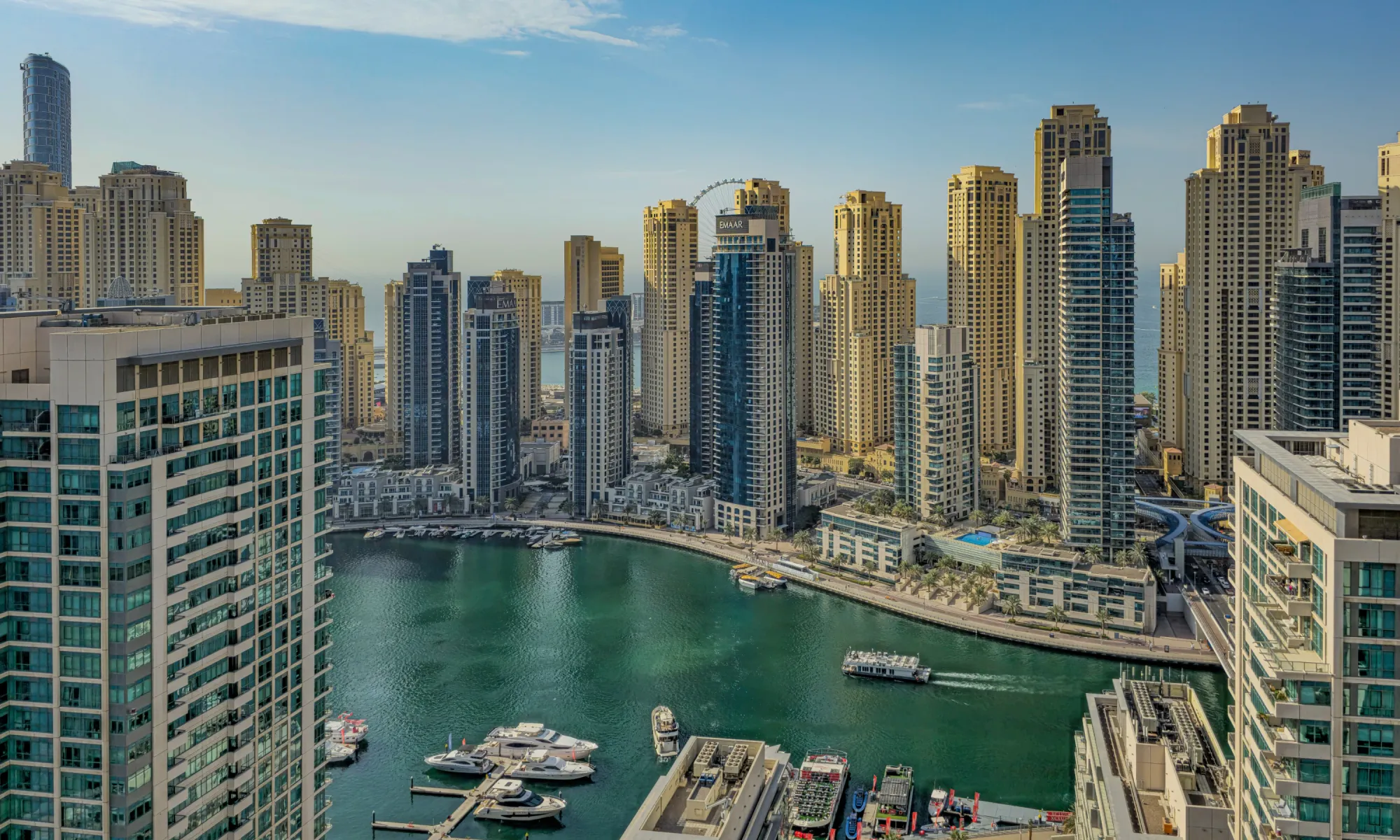
Dubai is famous for its bold vision and embrace of technology. Years before tokenization became headline news, the city was already laying groundwork. In 2017, Dubai launched the Blockchain Strategy aiming to use blockchain in every part of government. The Dubai Land Department (DLD) began testing blockchain for property records and rental contracts, gaining early experience in how this technology could streamline real estate transactions. These early trials built a foundation for bigger steps to come.
Fast forward to 2024: Dubai moved from theory to action by creating a legal framework for tokenized real estate. In March 2024, the DLD launched a pilot project under its Real Estate Evolution Strategy (REES) to start tokenizing properties. This pilot wasn’t just a tech demo – it was backed by new rules and regulations. The DLD teamed up with the city’s Virtual Assets Regulatory Authority (VARA) to make sure that property tokens fall under both real estate law and digital asset regulations. In other words, Dubai combined its traditional property laws with new crypto-friendly rules so that tokenized real estate would be fully legal and protected. Rather than keeping old and new systems separate, Dubai integrated blockchain tokens into its existing legal system, ensuring every property token is covered by the law. This approach gives investors confidence that their digital ownership is just as secure as a traditional title deed.
Dubai’s leadership didn’t stop there. In May 2025, VARA introduced updated regulations specifically to accommodate real-world asset tokenization. The regulator created a new class of digital assets called Asset-Referenced Virtual Assets (ARVAs) designed for things like real estate tokens. Under this framework, anyone issuing tokenized property in Dubai must follow strict guidelines – obtaining a VARA license, meeting financial standards, undergoing audits, and making proper disclosures. In short, Dubai built a regulated, secure environment for tokenized real estate from the ground up. Instead of forcing new blockchain ideas into outdated laws, the UAE wrote fresh rules to fit the technology. This clarity in regulation is a key reason Dubai has pulled ahead in this field. While many countries are still debating how to handle crypto and property, Dubai already has “rails” in place – the legal tracks on which tokenized real estate can run safely.
How Tokenized Property Works in Dubai

So, what does real estate tokenization look like in practice in Dubai? It’s surprisingly straightforward. The Dubai Land Department, with partners in the tech sector, launched a platform called Prypco Mint for tokenized real estate investments. Through this government-backed platform, everyday people can buy shares of a property for as little as AED 2,000 (around USD $540). All transactions currently use UAE’s local currency (dirhams) and no cryptocurrencies are involved in the pilot phase, which helps keep the process familiar and trusted.
An investor simply signs up, completes the necessary KYC (know-your-customer) identity checks, and can then purchase tokens of a listed property. Each token purchase is recorded on a blockchain that is integrated with the government’s land registry systems, so the blockchain and the official property records stay in sync. This is crucial – it means that if you own 1% of a property via tokens, the Land Department’s records reflect that ownership in their database, ensuring your digital stake is tied to the real-world legal title.
Currently, the service has been in a pilot stage with access initially limited to UAE residents who hold an Emirates ID (and are over 18). This cautious rollout allowed regulators to monitor and refine the system domestically first. Even with that restriction, the platform saw a huge response (more on that in a moment). The good news is that Dubai plans to open tokenized real estate investment to global buyers in the near future as the system matures. In fact, officials have already indicated that expansion beyond the UAE is on the horizon. This means a person sitting in London or Mumbai could soon invest in a fraction of a Dubai apartment with a few clicks – something that was nearly impossible before now.
The tokens themselves come with some rules to protect the market. For example, there may be an initial holding period before you can resell your tokens, preventing quick flips and speculation. Investors are also usually capped on how much of one property they can own via tokens (often a maximum of 20% per person), so that one investor doesn’t end up controlling the majority of a property through the token platform. These measures keep the fractional ownership model fair and balanced. Moreover, if the property generates rent, token holders receive their share of income, and if the property is sold down the line (with investor approval), each token holder gets their portion of the sale proceeds. Essentially, token holders enjoy the same kinds of returns as any property investor – proportional profit if the property value rises or is sold, and proportional rental income if it’s leased out.
All of this is done under regulatory oversight and banking support. Notably, a local digital bank (Zand Bank) was appointed as the banking partner for the pilot phase, ensuring that money flows (like investor funds and payouts) are handled through licensed channels. The UAE’s Central Bank and the Dubai Future Foundation have also been involved in shaping the project, underscoring that this is a well-coordinated initiative, not just a startup experiment. By involving multiple authorities (land department, financial regulators, central bank), Dubai is making tokenization part of the official infrastructure of the real estate market rather than a parallel unofficial system.
Early Success Stories and Global Interest
Dubai’s foray into tokenized real estate has already yielded remarkable results. When the first tokenized properties were offered on the Prypco Mint platform in 2025, investor demand was off the charts. The very first tokenized property – a unit in a development in Business Bay – sold out its tokens in under 24 hours, attracting 224 investors from 40 different countries. Think about that: people from dozens of nations, many of whom had never invested in Dubai before, were able to quickly buy into a piece of the city’s real estate. This truly demonstrates the power of opening Dubai’s market to a global pool of investors through digital means.
The second property listing was even more dramatic – it sold out in less than two minutes, as eager buyers snapped up the tokens almost instantly. In just the month of May 2025, about $399 million worth of Dubai property was tokenized, which amounted to nearly 17% of all real estate sales in Dubai that month. In other words, tokenized sales grabbed a substantial share of the market right away. Over 70% of these buyers were first-time investors in Dubai real estate, meaning the token approach is bringing in fresh investors who previously might have found buying property in Dubai too difficult or expensive. This influx of new investors – many of whom are retail investors using crypto wallets – shows how tokenization can democratize access to prime real estate. You no longer need to be a millionaire or a local resident to own a stake in Dubai property; anyone with a few hundred dollars can participate globally.
It’s not just individual small investors getting involved. Major developers and financial institutions have also “bought in” to the tokenization trend. In May 2025, one of Dubai’s prominent developers (MAG) signed a $3 billion agreement to tokenize a portfolio of luxury properties in the city. This deal – done in partnership with an international financial group (MultiBank) and a tokenization firm – aims to move high-end projects like the Ritz-Carlton Residences and Keturah Reserve onto the blockchain. Investors will be able to buy shares of these upscale properties through a regulated online platform. At the time of signing, it was the largest real estate tokenization deal in the world. And the vision doesn’t stop at $3 billion – the parties hinted it could expand to as much as $10 billion in tokenized assets over time. By turning marquee developments into tradeable tokens, Dubai is opening its luxury real estate market to a wider base of global investors, including those who want exposure to property but in fractional, more affordable slices. This move also shows big players have confidence that the legal and technical framework in Dubai can support large-scale tokenization.
The government’s own pilot and these private deals all feed into Dubai’s broader strategy. The city has stated bold targets: officials estimate that tokenized properties could make up about 7% of Dubai’s total real estate market by 2033. In value, that’s roughly AED 60 billion (USD $16 billion) worth of properties turned into digital shares. Even if this takes a decade, it’s a significant portion and signals that tokenization is not meant to remain a niche experiment. Dubai’s Economic Agenda (known as D33) and its Real Estate Strategy 2033 both embrace such digital transformation, aiming to future-proof the property sector. In simple terms, tokenization aligns with Dubai’s goal of being a high-tech, globally attractive investment hub.
Benefits for Investors, Developers, and Dubai
Why is Dubai pushing tokenization so strongly? The benefits cut across the board:
- For investors
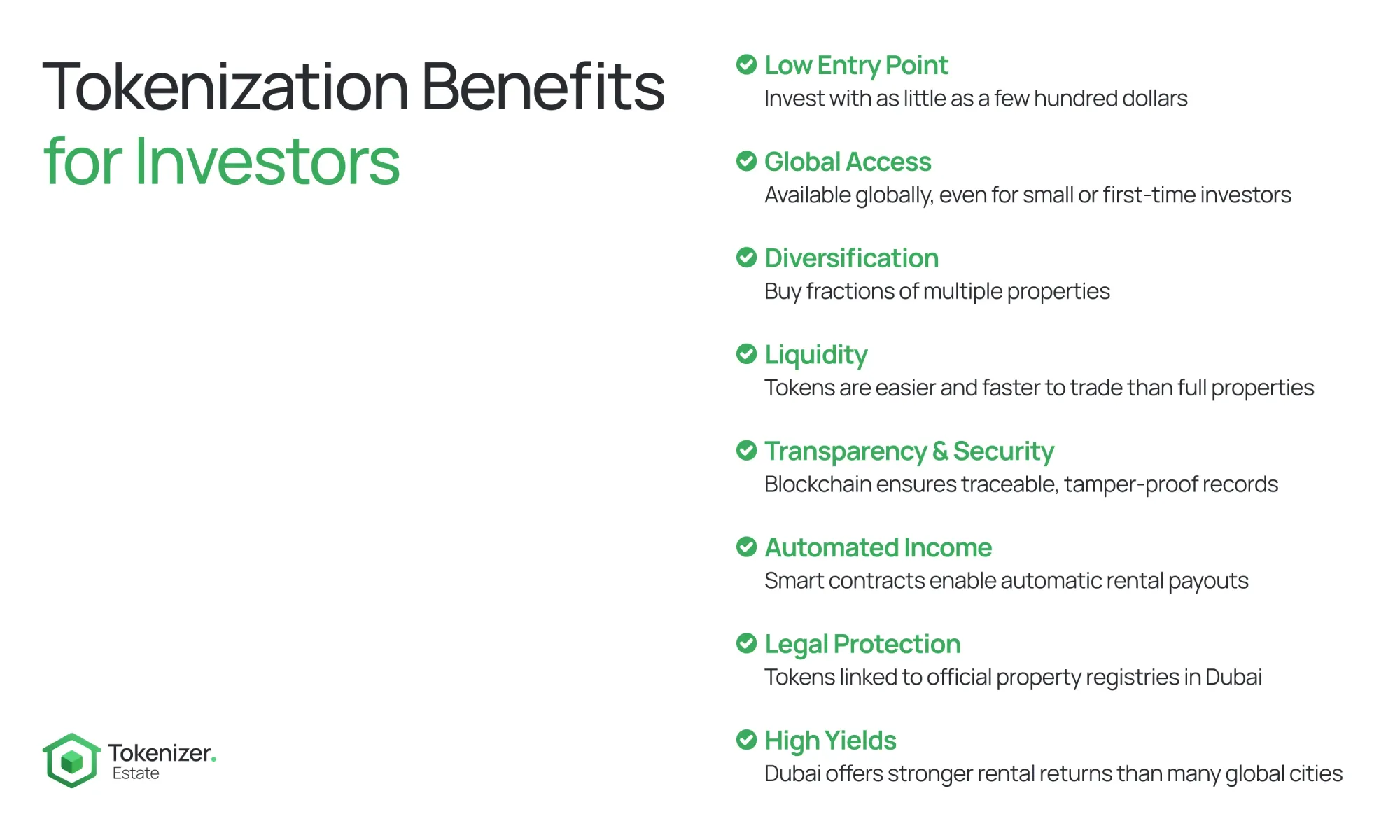
Tokenization lowers the barrier to entry dramatically. Instead of needing hundreds of thousands of dollars to buy a whole property, an investor can start with a few hundred dollars to buy a fraction. This opens the market to young investors, those of moderate means, or anyone globally who wants exposure to Dubai’s real estate. Investors can easily diversify by buying tokens in multiple properties instead of putting all their capital in one building. Tokens are also more liquid than traditional property ownership – while selling a house can take months, trading a token could eventually be as quick as selling a stock (especially as secondary trading platforms develop after the initial holding period). Additionally, blockchain’s transparency and security mean investors can trust the records and enjoy faster transactions without piles of paperwork. The traceability of each token trade on blockchain reduces fraud and error, and smart contracts can automate dividend (rental income) payouts to token holders. In Dubai’s case, another big plus is the strong legal protection: each token is anchored to official registry records, giving investors confidence that their piece of the property is recognized by courts and authorities. And because Dubai’s rental yields are often higher than in many global cities, even a small token investment can yield decent returns over time.
- For developers and property owners
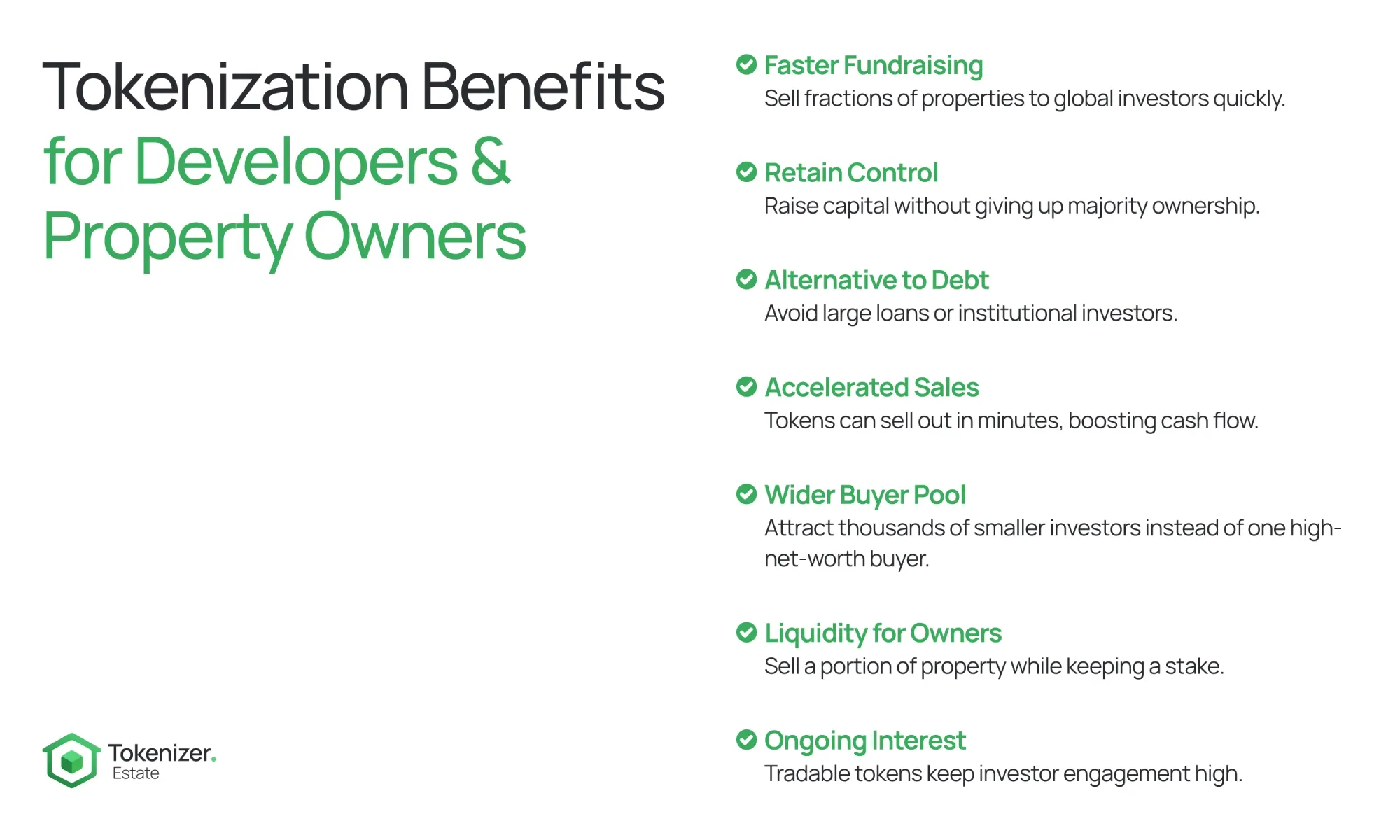
Tokenization offers a new way to raise funds and unlock liquidity. A developer can sell 49% of a building in token form to many investors around the world, raising capital quickly, while still retaining majority ownership and control. This provides an alternative to taking large bank loans or seeking a few big investors. In Dubai, developers see tokenization as a way to access global capital markets without giving up equity or taking on heavy debt. It can speed up sales for new projects – as seen by tokens selling out in minutes – meaning developers get faster access to cash flow. By fractionalizing a high-value asset (like a luxury villa), they can tap into a much larger pool of buyers. It’s the difference between needing one buyer with $5 million or 5,000 buyers with $1,000 each. Tokenization also increases a property’s liquidity: even after initial sale, those tokens can be traded, which is attractive to investors and can keep interest high in the project. For property owners, tokenization could allow them to sell a portion of their property to free up cash while still keeping a stake. Essentially, it turns real estate (usually an illiquid asset) into something closer to a liquid asset.
- For Dubai and the broader economy
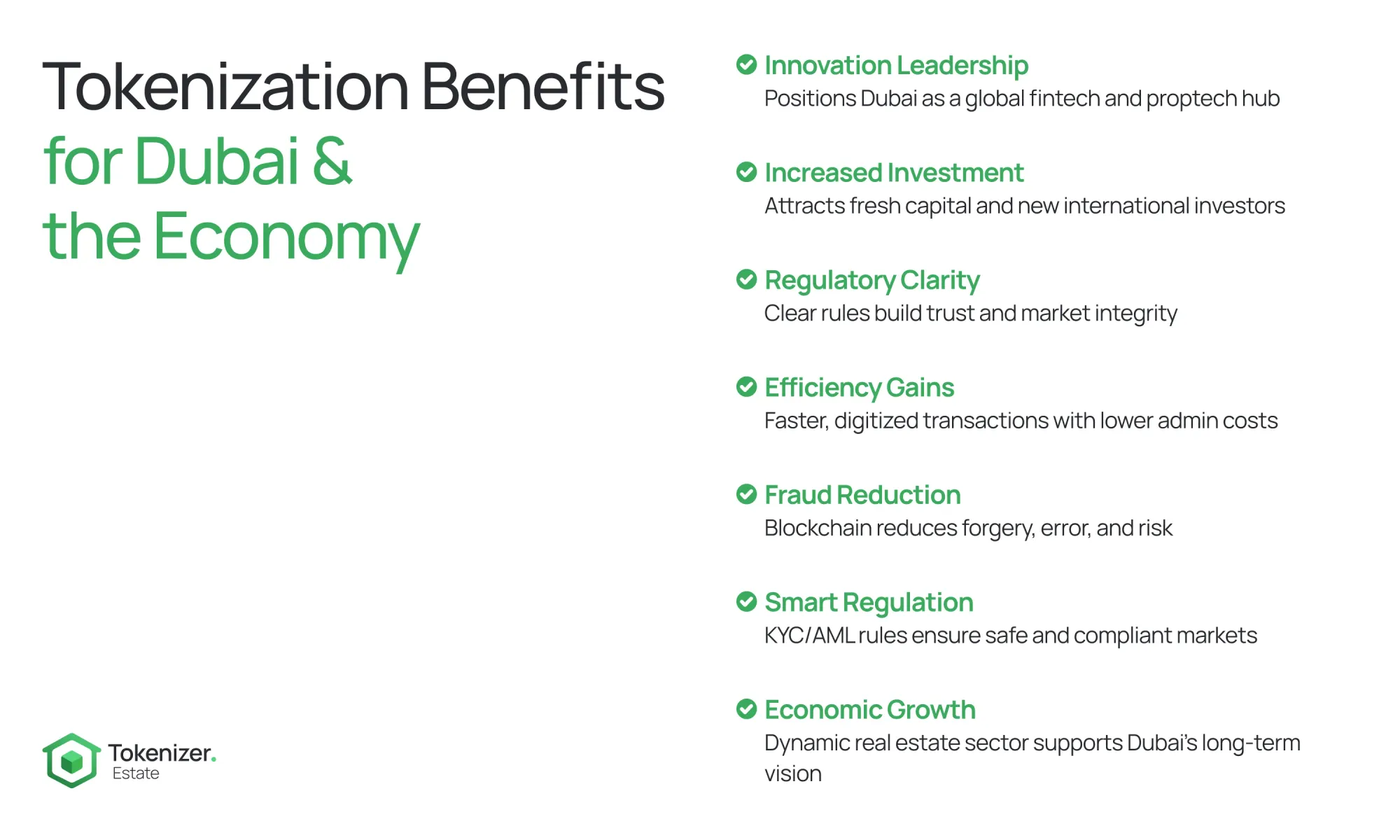
Embracing real estate tokenization cements Dubai’s reputation as an innovative global financial hub. It attracts fintech companies, blockchain startups, and proptech innovators to set up in the city, boosting the tech ecosystem. The move also draws international investors who might have never considered investing in Dubai before – bringing in fresh capital. By being one of the first jurisdictions with clear rules for property tokens, Dubai is setting itself up as a go-to marketplace for tokenized assets, much like how some cities became global centers for stock trading or REITs. There’s also an efficiency gain: a blockchain-based system can make property transactions faster and reduce administrative overhead in the long run (fewer manual title transfers, less risk of forgery, etc.). Dubai’s approach also ensures investor protection and market integrity – by regulating tokens as securities and requiring KYC/AML compliance, the city aims to prevent fraud and illicit flows in this new market. All these factors contribute to a more dynamic real estate sector that can support the city’s growth ambitions.
Challenges and Considerations
While the outlook is exciting, Dubai’s tokenization journey comes with challenges that authorities and businesses are carefully navigating. Legal and regulatory clarity was the first hurdle – and Dubai tackled this by updating laws and creating VARA’s new rulebook for virtual assets. Even so, implementing these rules in real-life scenarios is an ongoing process. For instance, how should tokenized property be taxed? This is a question that experts are now examining. In the UAE, real estate transactions have VAT (value-added tax) implications – typically 5% VAT on commercial property sales or rent (residential is usually exempt). If a property is represented by tokens, should those token trades be taxed like property, or treated like financial instrument trades which might be VAT-exempt? The answer isn’t immediately obvious. Tax advisors note that if tokens are viewed as virtual assets (like a financial service), their issuance and trading might qualify for VAT exemptions or zero tax, but if they’re treated as traditional property interests, then the usual 5% VAT could apply to commercial property tokens. Rental income distributed via tokens also needs clarification on whether it’s treated as property rent (taxable in some cases) or a dividend. The government will need to issue clear guidelines so that investors and companies know how to remain compliant. This kind of granular regulatory fine-tuning is ongoing, and Dubai’s openness to innovation means the authorities are actively working on such issues (indeed, the very fact that Dubai has a regulatory sandbox for real estate tokenization shows that these details are being tested and ironed out).
Another consideration is investor education and market awareness. Tokenization is a new concept to many. Helping people understand that buying a token is not a scam but a legitimate, government-sanctioned form of investment is crucial. The Dubai Land Department has made efforts to promote awareness of tokenized real estate products. Clear communication that tokens are backed by real assets and legal rights will build trust among the public. Additionally, platforms must be user-friendly enough so that even non-technical investors find it easy to participate without fear.
There’s also the matter of market stability and security. With any blockchain system, cybersecurity is paramount. Investors need confidence that the token platform is secure from hacks and that their digital assets (tokens) won’t be stolen or lost. Dubai’s approach of working with regulated entities and approved technology providers is aimed at mitigating these risks. The selection of the XRP Ledger for the pilot platform (as noted by the tech partner Ctrl Alt) was presumably due to its reliability and ability to integrate with banking systems. Still, continuous audits and security upgrades will be needed to safeguard the ecosystem. Fraud prevention is another challenge – however, by keeping the official land registry involved (so every token corresponds to a registered interest in the property), Dubai reduces the chance of fraudulent token offerings, because a tokenized property can be cross-verified against government records.
Finally, market reception abroad could be a factor. As Dubai opens tokenized real estate to international buyers, it must consider how these tokens will be viewed in investors’ home countries. Will a person in Europe or Asia face any legal obstacles owning a Dubai property token? Possibly not, if it’s treated simply as owning foreign property or a security, but it’s something to watch. The good news is that by aligning tokenization with established legal concepts (like securities and property rights), Dubai makes it easier for foreign regulators or banks to understand what these tokens are.
A New Era of Property Investment

Dubai’s experience with real estate tokenization shows how a bold vision can turn into reality with the right mix of technology, regulation, and market enthusiasm. What started as a futuristic idea – selling property in digital fractions – is now a functioning part of the market. Live transactions are happening, from modest apartments to multi-billion dollar luxury developments, all through blockchain-based tokens. And it’s not just hype: the initiative is backed by new laws, government support, and real investor demand. Dubai has essentially built a bridge between the traditional real estate sector and the modern digital asset world.
The story of tokenization in Dubai is still in its early chapters, but the trajectory is clear. In a short span, Dubai has proven that tokenized real estate can work at scale, with robust legal underpinnings. Other global cities are watching closely. By solving challenges around legal recognition and investor protection, Dubai is emerging as a model for how to do this right. Some analysts even suggest Dubai could become the world’s first major real estate market to be predominantly powered by blockchain transactions if current trends continue. The city’s proactive stance – “execute, don’t just experiment,” as demonstrated by the rapid move from pilot to policy – sets it apart. While many jurisdictions grapple with fitting new tech into old frameworks, Dubai shows the benefit of writing new rules for new tools, giving both innovation and investors a green light.
For investors and readers around the world, the key takeaway is that property investment is being reimagined. You don’t have to be a tycoon or go through months of paperwork to own a piece of one of the most dynamic real estate markets on the globe. With Dubai’s tokenization platforms, the market is opening up to everyone in bite-sized pieces. The city’s leaders often talk about shaping the future, and in the case of real estate tokenization, they’ve turned ambitious plans into something tangible and tangible – or perhaps we should say digital. If you ever dreamed of owning a part of Dubai, however small, that opportunity is no longer a fantasy. As Dubai likes to prove, the future is now – and it’s being sold one token at a time.

